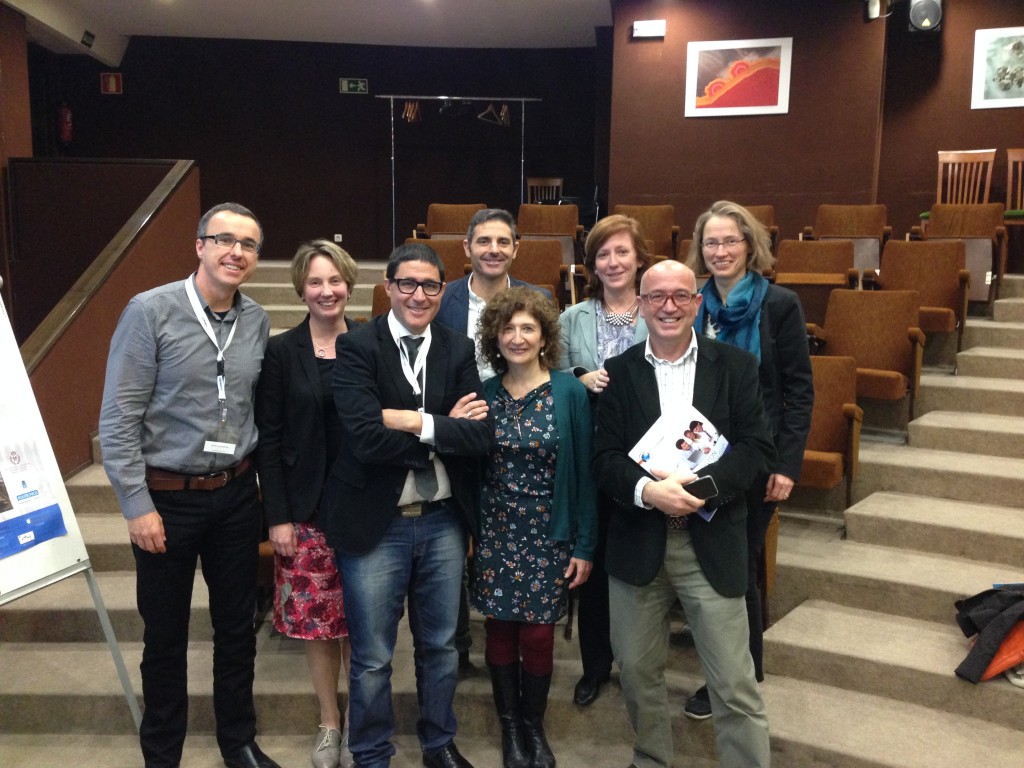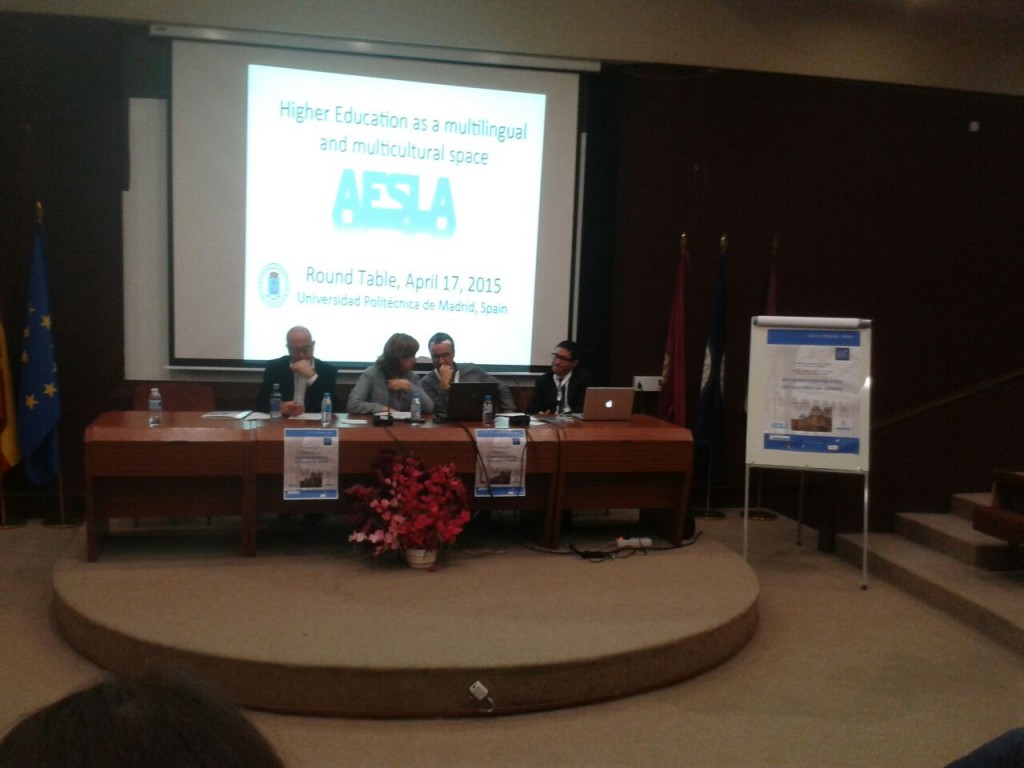Mesa redonda: La educación superior como espacio multilingüe y multicultural
Higher Education as a multilingual and multicultural space

Viernes 17 de abril de 2015, 12:00 – 13:30
MR12, Fundación, Salón Actos
AESLA 2015 Books of Abstracts
PANEL DE SOCIOLINGÜíSTICA
Organizadores: Emma Dafouz Milne (UCM) y Pascual Pérez Paredes (UMU)
Foro para la reflexión y el debate del eje temático “La educación superior como espacio multilingüe y multicultural” programado dentro del panel de Socioligüística.
Desde el punto de vista organizativo tendrá el siguiente formato:
1) introducción por parte de los organizadores (5 minutos)
2) intervención de 3 ponentes explicando las experiencias/logros/retos en su respectivas universidades (5 minutos cada uno)
3) síntesis y reflexión/comentario por parte de un “discussant” externo (5 minutos)
4) intervención de los otros 3 ponentes (5 minutos) y
5) síntesis y reflexión/comentario de un segundo “discussant” (5 minutos),
6) puesta en común global con la intervención de todos los miembros de la mesa + preguntas del público (20 -30 minutos) y cierre por uno de los organizadores.
En total 90 minutos

1) Introduction: Emma Dafouz, UCM
2) Part 1: 3 contributions
Striving to boost multilingualism in higher education: A case study
David Lasagabaster, University of the Basque Country UPV/EHU
University policy
Spolsky: examine what all actors involved think about it
Less attention to teachers and admin workers
The Multilingual Program in UPV started in 2005
Found interest in multilingualism but students are more reluctant. Good students reluctant to take part in EMI programs, afraid of negative impact on their grades.
Identifying the challenges of bilingual programmes in Higher Education: first decisions
Victor Pavón, University of Córdoba (Spain)
A mono lingual context.
Authorities are to be motivated to invest in this area and understand EMI, ICLHE or CLIL focus.
Employability is a key issue.
University policy to be affected.
Global language policy.
Incentives essential.
English-medium instruction as a transformation policy
Pascual Pérez Paredes, University of Murcia
3. Discussant for Part 1: Ute Smit (University of Vienna)
The above as good examples of language policy in action.
Complex map.
Internationalisation in Spain as a different issue from Austria
Language proficiency is topicalised.
Those in the management positions are not precisely those with expertise in language teaching or multilingualism.
English as a Lingua Franca: a process approach, it’s action, dynamic, diverse
4. Part 2: 3 contributions
The International Classroom in the European Higher Education Area: Multilingual policies towards internationalization in a bilingual university
Carmen Pérez Vidal, Universidad Pompeu Fabra
UPF policies on multilinguism in bilingual territories.
The impact of Bolognia process on language use in HE.
The PAM plan.
Linguistic security, a novel concept.
Quality of Plurilingual Higher Education programs in Andalusia
Fernando D. Rubio Alcalá, Universidad de Huelva
Multi/pluri terminology
Language competence in teachers
Interesting project in Andalucía
An interdisciplinary and international approach to English-medium instruction in Higher Education
Emma Dafouz Milne, Universidad Complutense Madrid
The views of the content teachers.
INTER-R-LICA
Dafouz & Smit (2014)
5. Discussant for part 2: Julia Hüttner, University of Southampton
Can universities do it all? Mutilingual programs in HE.
Education is a slow “project”.
What makes a university international?
We need more in-depth understanding of the comples landscape in different countries.
Cam we compare EMI in Spain to other countries?
6. Discussion: all participants take part as well as questions and comments from audience
7. Summary and conclusions: Pascual Pérez-Paredes

Short bios
David Lasagabaster is Associate Professor at the University of the Basque Country. From 2005 to 2009 he was responsible for the implementation of the Multilingualism Programme at his university. He has co-edited the volume “English-medium Instruction at Universities: Global Challenges” published by Multilingual Matters in 2013.
As an author, researcher and lecturer at the University of Córdoba (Spain), Víctor Pavón is active in bilingual education development programmes including higher education. Most recently he is coordinating the linguistic policy and the Bilingual Programme in this University.
Pascual Pérez-Paredes is Associate Professor with the University of Murcia. His main research interests are quantitative research of register variation, the compilation and use of language corpora and the implementation of Information and Communication Technologies in the field of applied linguistics. From Feb. 2011 to May 2014, Prof. Pérez-Paredes was General Coordinator of Campus Mare Nostrum, part of the Excellence Program of the Spanish Ministry of Education.
Carmen Pérez is a full lecturer of the Department of Translation and Philology at UPF. Doctor in English Philology by the UB (1995), she was awarded the research prize by the Spanish Association of Applied Linguistics. Previously, she obtained her Master’s in Applied Linguistics (Reading, UK) and her degrees in Hispanic Philology (UAB) and English Philology (UB). She is an official translator for French and English. She is investigating language acquisition in bilingual and multilingual circumstances, the age factor and the impact of mobility, both in European and national projects. She has directed UPF’s Language Training Programme since it was set up.
Fernando Rubio is Vice Dean Of International Relations and Plurilingualism at the Faculty of Education and a lecturer at the University of Huelva. His research interests lie primarily in the area of teaching and learning foreign languages, concretely affective factors, curriculum and plurilingualism. He has published these articles about plurilingual education: with Víctor Pavón: Teachers’ concerns and uncertainties about the introduction of CLIL programmes. Porta Linguarum, 2010; Toledo, I., Rubio, F.D. y Hermonsín, M. (2012). Creencias, rendimiento académico y actitudes de alumnos universitarios principiantes en un programa plurilingüe. Rubio, F.D. y Hermosín, M. (2010). Implantación de un programa de plurilingüismo en el Espacio Europeo de Educación Superior: Análisis de contexto y detección de necesidades. Siglo XXI. Revista de Educación. He has run a plurilingual program at the Faculty of Education since 2010.
Emma Dafouz is associate professor at the Complutense University of Madrid. Since 2001 she has focused on English-medium instruction (EMI) in higher education and currently coordinates an interdisciplinary research group, funded by the Spanish Ministry of Economy and Competitiveness, on the Internationalization of Higher Education and EMI. She has published in national and international journals (Language and Education, Modern Language Journal or Applied Linguistics). At present, she works as Advisor of the Language Plan for Internationalization at the Complutense University.



